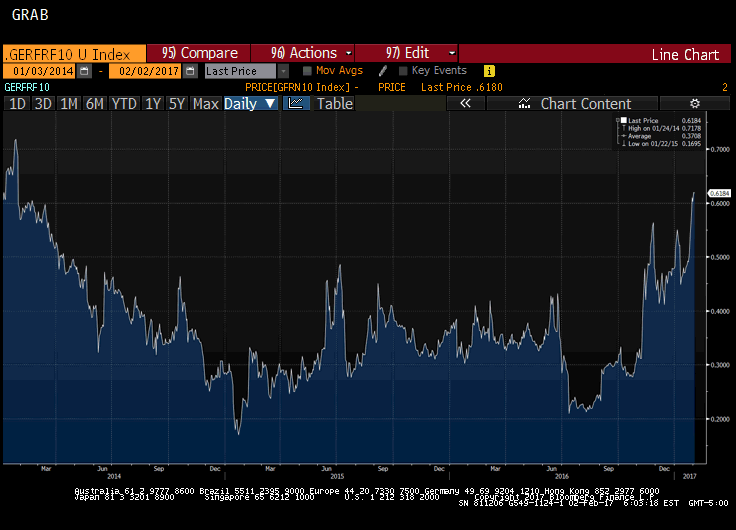The rise of interest rates in Europe has seen premiums over Germany increase. This is not unusual. Often the intra-European spreads are sensitive to the underlying direction of rates. The premiums often narrow in a falling rate environment and widen when rates are rising.

It is one thing for the Italian or Portuguese premium to rise, but what is striking now is the surge in the French premium. The premium bottomed last year near 22 bp in Q3. It is flat on the day a little above 60 bp, which is a three-year high. The Great Graphic created on Bloomberg, shows the French premium over Germany since the start of 2014.
Many investors are concerned about the presidential election in April (second round in May). The leading establishment candidate, Fillon, has been snared in a scandal over hiring his immediate family as advisers and this has seen his poll support wane. At the same time, the Socialists have nominated a candidate from its left wing. The main two parties appear to have vacated the middle that is being filled by Macron.
The latest polls show Macron moving into second place behind Le Pen. The polls show both Macron and Fillon beating Le Pen in the second round. Many are skeptical of polls because of the recent track record in Scotland, UK and the US. While there is some merit in the argument, the problem is that often the polls were misused or misunderstood. The polls conducted by firms outside of Scotland generally showed the referendum losing. The UK polls showed a close contest, and many who relied on the polls did not deem it necessary to discuss the margin of error. In the US, many polls showed a tight race and a victory for Clinton. At the end of the day, Clinton did win the popular contest by nearly three million votes.
France has a bit of a tradition of the two main parties joining forces to defeat a challenge from Le Pen. In addition, some contacts suggest that the combination of Brexit and the US election are strengthening the moderate voices in Europe, and France in particular.
Here is the basis for a more constructive outlook for Europe. The Dutch go to the polls in March. The populist-nationalist Wilders may get a plurality of votes, but is unlikely to be able to form a majority government. Le Pen is defeated in France. Germany's Schulz, the former head of EU Parliament, is helping the SPD in the polls, but it only now matching its nearly 26% performance in 2013. Merkel's CDU/CSU is polling 35% and the latest polls show AfD support has slipped to 11% (from 14%).
If Greece goes to the polls, the center-right New Democracy has the advantage. Italy may go to the polls near mid-year. The 5-Star Movement is encountering challenges to make the transition from being an opposition force a governing party. Its Mayor of Rome is having a difficult time, and is under investigation.
